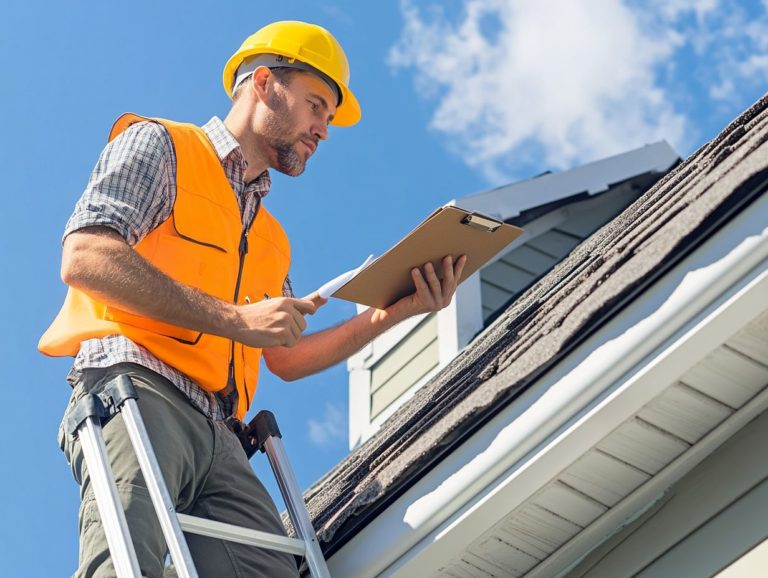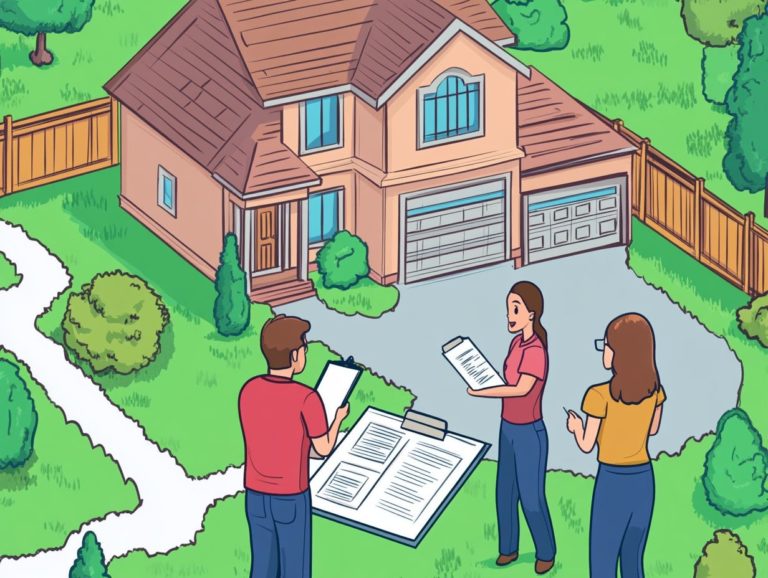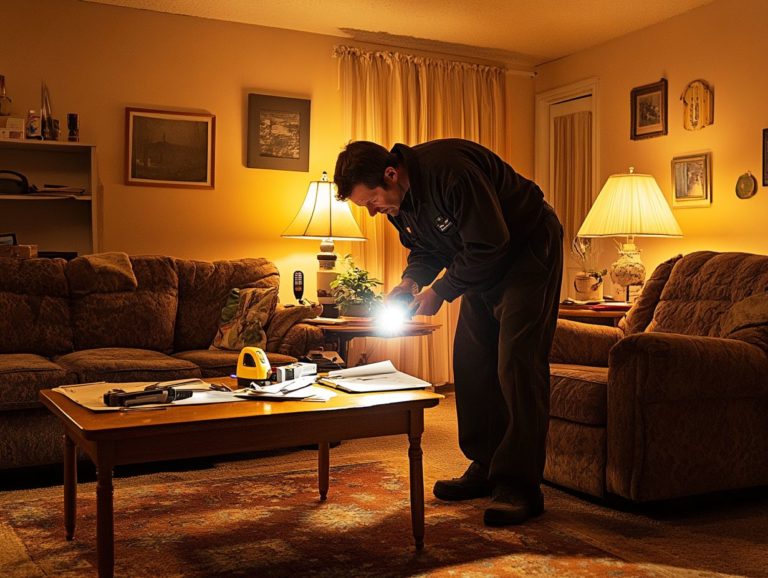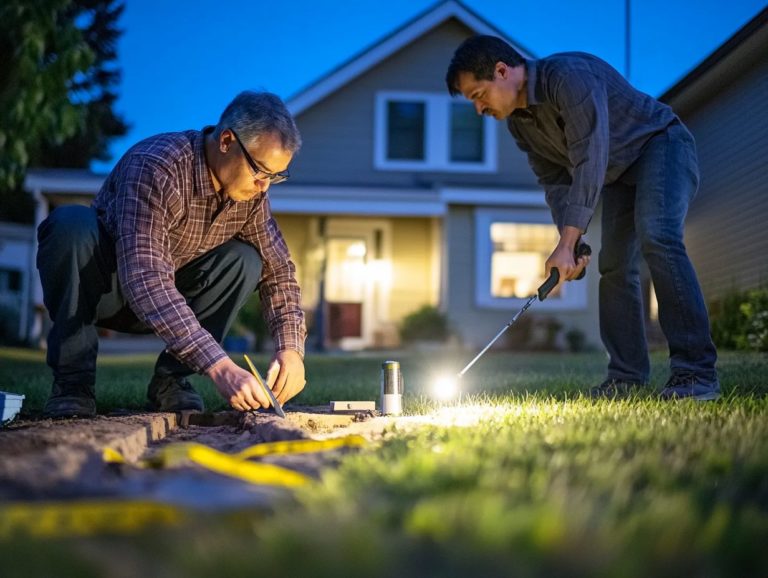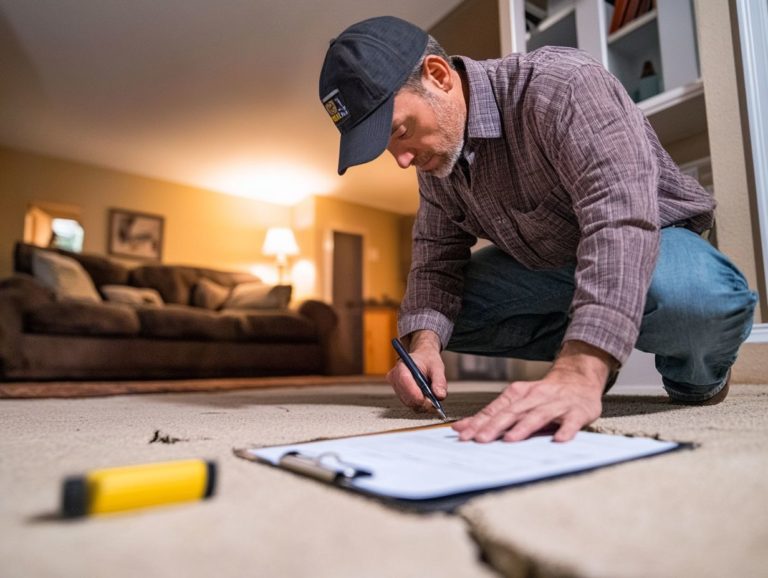Understanding the Home Inspection Process
Buying a home stands as one of the most significant decisions you’ll ever encounter. A comprehensive home inspection is an essential step in that journey.
This article provides you with everything you need to know about home inspections what they entail, their importance, and the circumstances under which they become necessary.
It also guides you in selecting the right inspector and sets your expectations for the process. Additionally, it highlights common issues that may arise and offers valuable tips for ensuring a successful inspection.
Whether you re a first-time buyer or a seasoned homeowner, grasping the intricacies of home inspections can ultimately save you time, money, and a great deal of stress.
Contents
Key Takeaways:
- A home inspection is a crucial step in the home buying process, providing a thorough assessment of the property’s condition.
- It is important to schedule a home inspection before purchasing or selling a home to identify any potential issues.
- When choosing a home inspector, consider factors such as experience, credentials, and reviews to ensure a high-quality inspection.
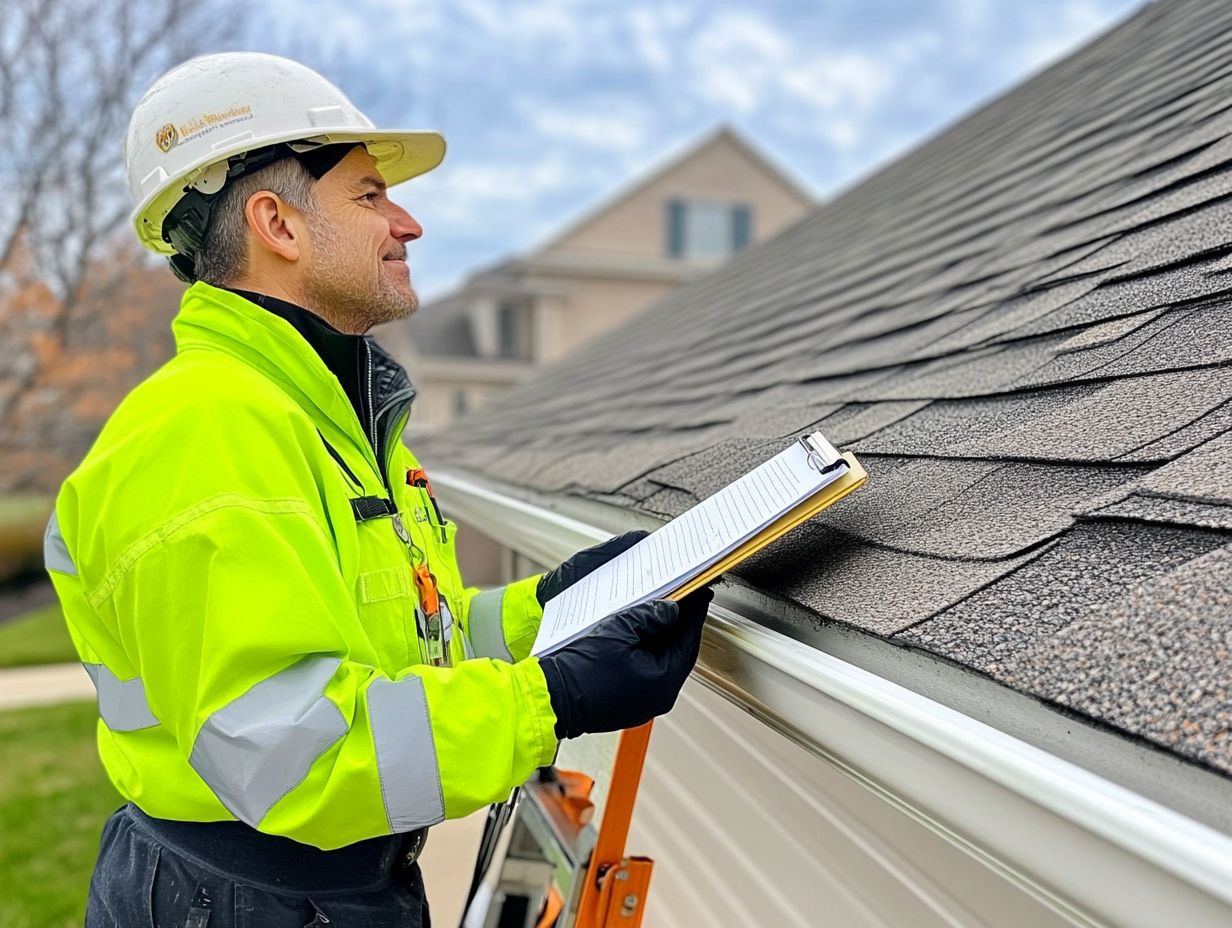
What is a Home Inspection?
A home inspection is a comprehensive assessment of a property’s condition. It is typically undertaken prior to a real estate transaction and offers invaluable insights for both home buyers and sellers. Understanding the home inspection timeline can further enhance this process.
During the inspection, experts closely scrutinize structural components, electrical systems, and HVAC systems which control heating, ventilation, and air conditioning along with other critical areas. This helps uncover serious issues that could impact the property’s value or safety.
The resulting inspection report becomes an essential document for negotiations. It equips buyers with knowledge of potential concerns and enables sellers to address these matters proactively.
Purpose and Importance
The primary purpose of a home inspection is to identify potential safety issues before you proceed with your purchase. This safeguards both you and the seller in the real estate transaction.
This thorough evaluation is essential for assessing the overall condition of the property. It enables you to make informed decisions and pinpoints necessary repairs and ongoing maintenance concerns.
Real estate agents often play an important role in this process, guiding you through the implications of the findings and advising on the best next steps.
Ultimately, a comprehensive home inspection protects your financial investment and fosters transparency and trust throughout the entire transaction process.
When is a Home Inspection Necessary?
A home inspection is a must-have in many situations, particularly during the home buying and selling process. Understanding the home inspection process for sellers plays an important role in validating the property’s value and condition. This provides assurance for both the buyer and the seller.
Instances and Circumstances
Home inspections are typically conducted at various crucial moments. For example, when a home buyer shows interest in a property or when sellers take a proactive approach to identify issues before listing their home.
These evaluations become especially vital during negotiations or if the property hasn t been inspected in a while. They can reveal hidden concerns that might otherwise remain undetected.
For instance, you might request an inspection before closing to confirm that the property is in good shape and free from significant defects. In such situations, the insights from the inspection report can greatly impact your decision to move forward, seek repairs, or negotiate a lower price making it an invaluable resource in the real estate transaction process.
Choosing a Home Inspector
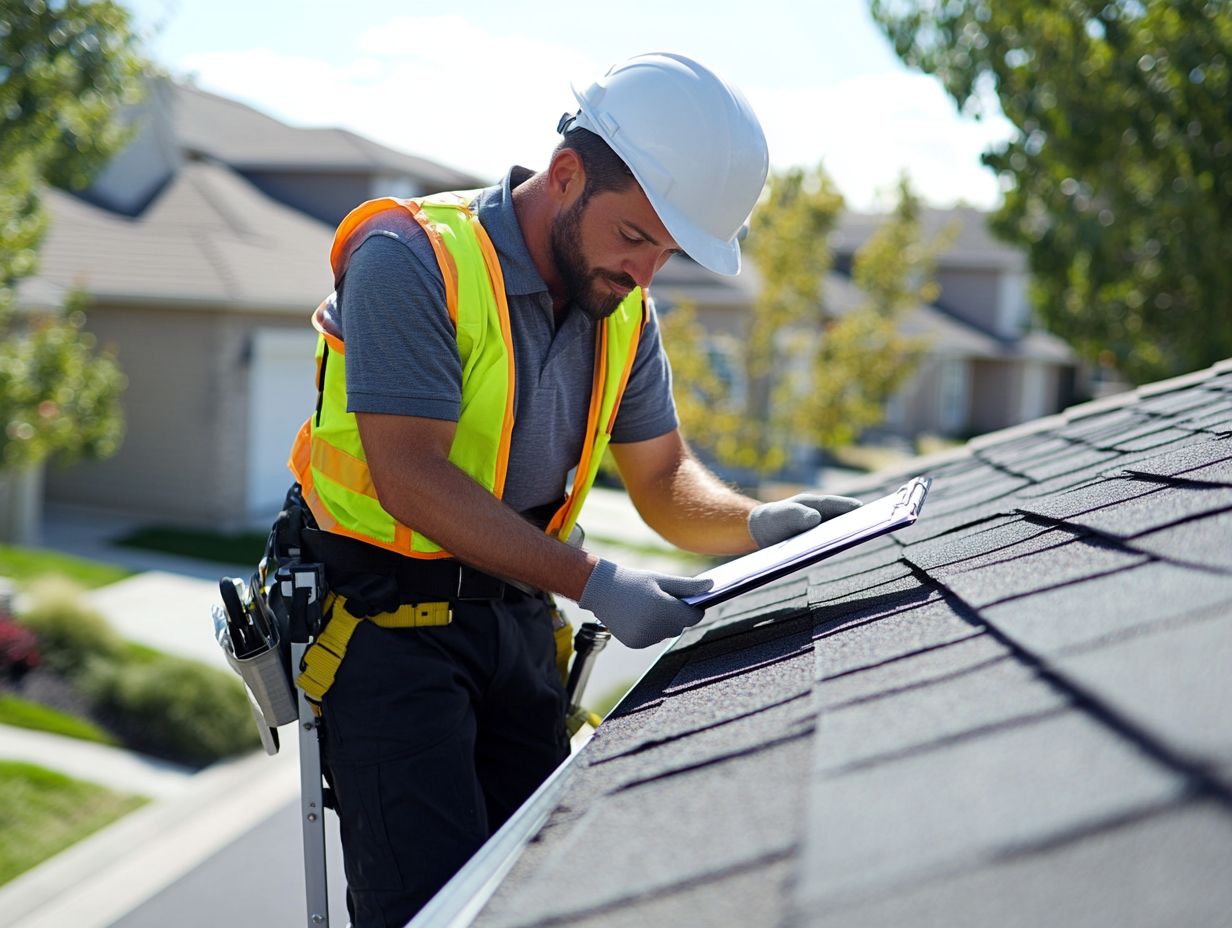
Selecting a qualified home inspector is essential for you, whether you’re buying or selling a home.
The inspector s expertise plays an important role in shaping the home inspection process. It ultimately impacts the integrity of the final inspection report.
Making the right choice here can make all the difference in your real estate journey.
Start your home buying journey with a thorough inspection today!
Factors to Consider
When selecting a home inspector, consider several key factors. Focus on the inspector’s credentials, experience, and membership in reputable organizations like ASHI.
Paying attention to past reviews is essential. They can reveal a lot about the inspector’s reliability and thoroughness. Recommendations from real estate agents are also invaluable, as they understand the importance of entrusting this task to someone with a solid track record.
A comprehensive understanding of local building codes and standards is critical for any inspector. This knowledge enables them to pinpoint potential issues that might escape the untrained eye.
These factors lead to a more thorough inspection process. You’ll be well-informed about the property’s condition and needed repairs.
The Home Inspection Process
The home inspection process is an intricate and methodical journey. For a thorough understanding, it involves a comprehensive examination of the property’s many components, which is detailed in understanding the home inspection process.
This meticulous approach results in an inspection report that highlights serious issues and provides valuable insights into structural elements, electrical systems, and HVAC systems.
Step-by-Step Guide
A meticulous step-by-step guide to the home inspection process unfolds like this: it begins with scheduling, transitions into the actual inspection, and culminates in the delivery of a comprehensive report that details the findings for the buyer or seller. For more details, refer to this understanding the process of home inspections.
Your journey kicks off by arranging the inspection at a time that suits everyone involved. This allows both parties ample opportunity to prepare for the visit.
During the inspection, a process that usually spans a few hours, the inspector conducts a thorough examination of the property. They scrutinize everything from the roof to the foundation while documenting any issues they encounter. This meticulous approach is often guided by a home inspection process checklist, ensuring that no critical areas are overlooked.
Once the inspection is complete, a final walkthrough takes place. This moment allows you to ask questions and seek clarity on the findings.
In the end, the inspector compiles a detailed report that outlines both minor and major concerns. This equips you with essential information to make informed decisions as you move forward.
Common Issues Found During Home Inspections
During a home inspection, you may encounter a variety of common issues. These can range from minor repairs to more significant concerns.
Common issues might include foundation problems, outdated electrical systems, and potential safety hazards like mold, radon, and termite infestations.
Knowing these common issues prepares you to tackle homeownership with confidence and ease!
Identifying and Addressing Problems
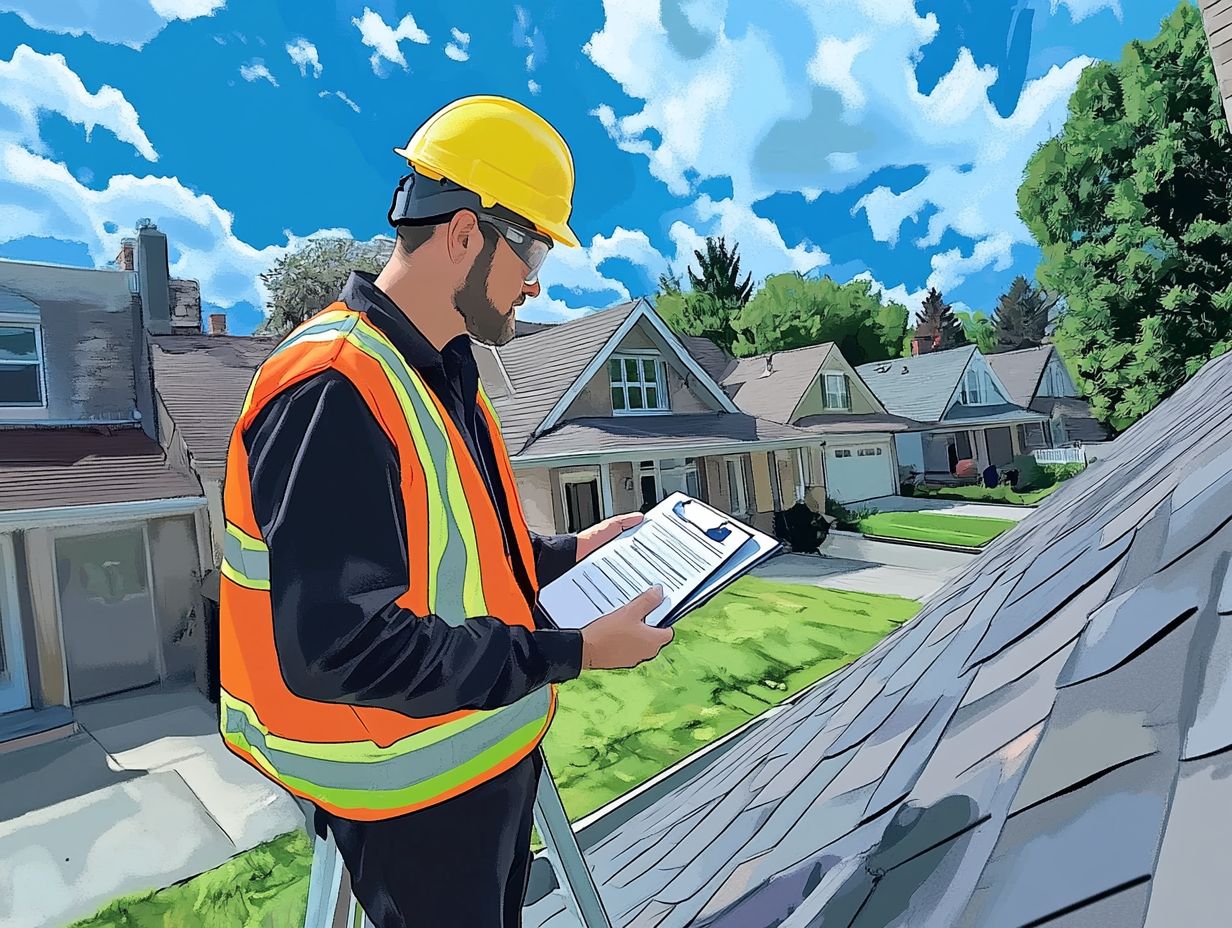
Identifying and addressing issues during a home inspection is essential for both buyers and sellers. It enables you to make informed decisions and negotiate effectively based on the discovery of significant problems and safety concerns.
The process begins with an essential examination of the property. Inspectors look for structural flaws, mold, electrical issues, and other potential hazards that could affect your investment!
Once these issues are uncovered, you can prioritize which repairs need immediate attention if you re the buyer.
If you re selling, you can choose whether to fix the problems before listing or offer concessions during negotiations. Effectively managing these findings can significantly shape the terms of the sale, influencing everything from the final price to contingency clauses.
Maintaining open communication about these issues between both parties fosters a more transparent negotiation process. This ultimately ensures a smoother transaction and minimizes the chances of future disputes.
Costs and Timeframe of a Home Inspection
Grasping the costs and timeframe associated with a home inspection is essential for you as a home buyer or seller. Understanding the importance of home inspections shapes your budget considerations and sets realistic expectations throughout the real estate transaction.
Understanding these factors enables you to plan effectively for your home inspection journey!
Factors Affecting Price and Duration
Several factors influence the price and duration of a home inspection. These include the property’s size, location, and the details of the inspection process.
If the property has special features, such as a swimming pool or outdated electrical systems, be ready for complications that may increase both time and cost.
Weather conditions can also impact the inspection. For instance, a rainy day might restrict access to certain areas, making the process take longer.
As a buyer, it s crucial to understand that a thorough inspection may reveal hidden issues, leading to further negotiations. On the other hand, sellers often find that a quick inspection can speed up the sale.
By recognizing these variables, you ll be better prepared to navigate the implications for both the transaction timeline and associated costs.
Tips for a Successful Home Inspection
Tips for a successful home inspection can greatly enhance your experience as both a homebuyer and a seller.
Being well-prepared and engaged in the inspection process positions you for the best outcomes, paving the way for a smooth transaction.
Preparing for and Participating in the Inspection
Being involved in the home inspection is vital for you as a homebuyer or seller. It helps you understand the home inspection process and interact effectively with the inspector.
Gathering all necessary documents, like maintenance records and past inspection reports, can enhance your experience significantly.
Knowing what’s being inspected such as plumbing, electrical systems, and structural integrity gives you crucial insights for a successful negotiation!
When you actively participate in the inspection, you gain clarity on potential issues and help create a collaborative atmosphere. This proactive approach leads to a more satisfying buying or selling experience.
Frequently Asked Questions
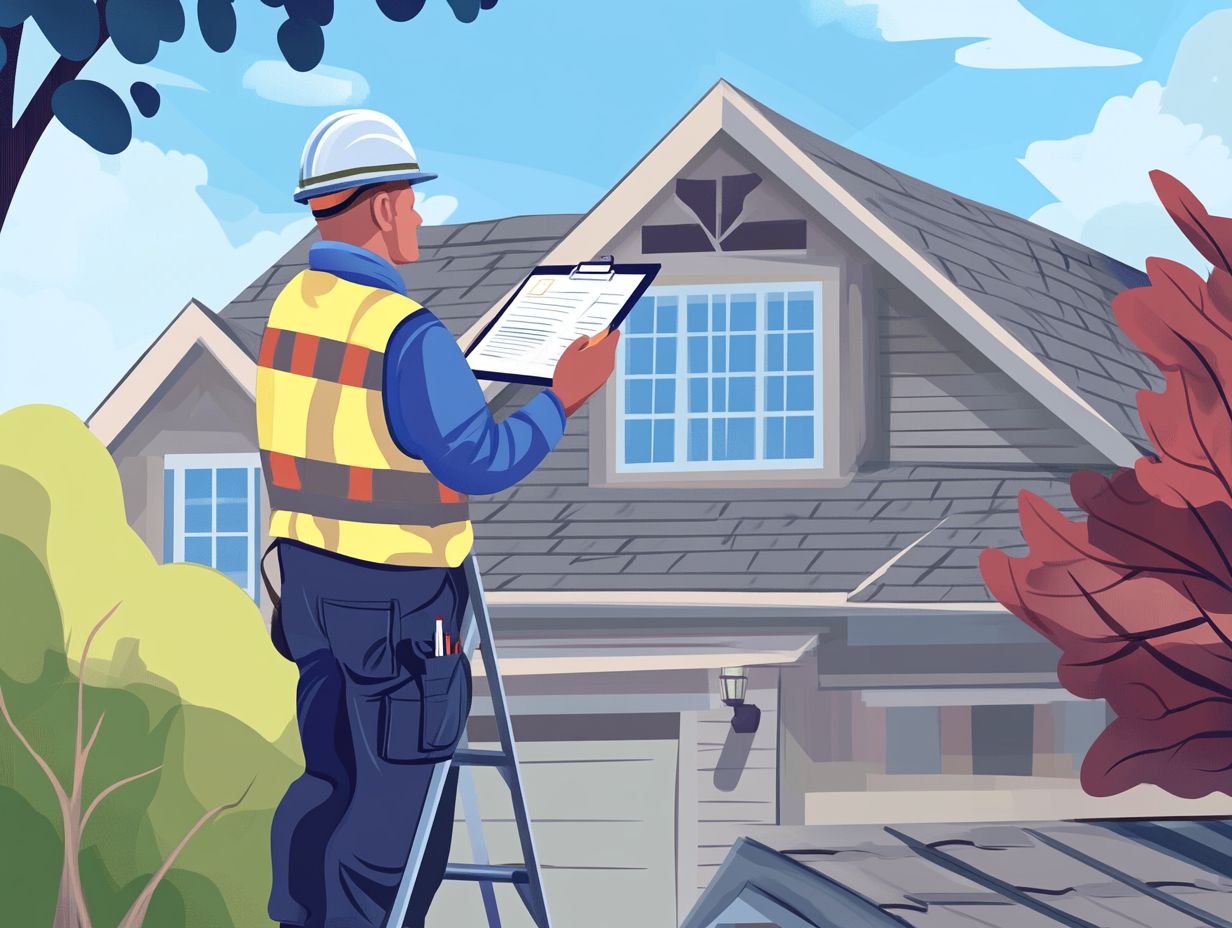
What is the purpose of a home inspection?
A home inspection provides a comprehensive evaluation of a property’s condition. This helps buyers and homeowners understand the home inspection process timeline and identify any potential issues before making a purchase or listing their home for sale.
Who typically pays for a home inspection?
In most cases, the buyer pays for a home inspection. However, sometimes sellers opt for a pre-listing inspection to identify issues before listing their home for sale.
What does a home inspection cover?
A home inspection typically covers the condition of major systems and components, such as the roof, foundation, plumbing, electrical systems, and heating, ventilation, and air conditioning (HVAC). It may also include checks for safety hazards or code violations.
How long does a home inspection usually take?
The length of a home inspection can vary based on the size and condition of the home. On average, it takes 2-3 hours, but larger or older homes may require more time.
Can I be present during the home inspection process?
Yes, you should definitely be present during the home inspection process. This allows you to ask questions and gain a better understanding of the home s condition and any potential issues.
What happens if issues are found during the home inspection?
If issues are found, the buyer and seller will need to negotiate how to address them. This might involve repairs or a reduction in the sales price. It is essential to have a professional home inspector and a real estate agent to guide you through this process.
Ready to schedule your home inspection? Don’t wait take the next step in your buying or selling journey today!

